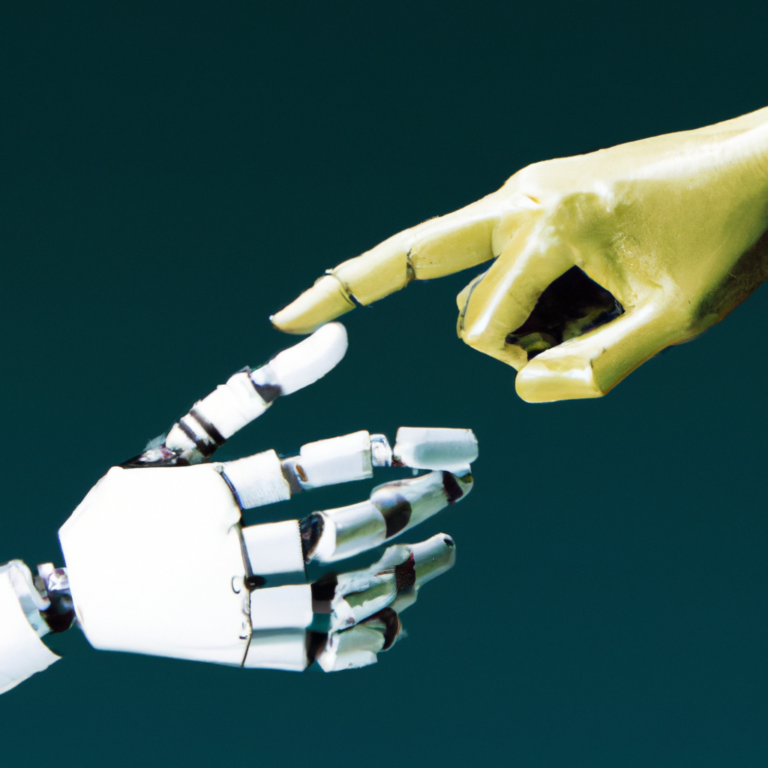AI And The Ethical Challenges Of Using AI For Warfare: What Are The Ethical Implications Of Using AI In Combat?

Imagine a world where machines are not only capable of performing tasks with incredible precision and accuracy, but also have the ability to make decisions on their own. This is the reality we are slowly embarking upon with the rise of artificial intelligence (AI). However, as we embrace this new era of technological advancement, a pressing question arises: what are the ethical implications of using AI in combat? In this article, we will delve into the complex and thought-provoking world of AI and explore the ethical challenges it presents in the context of warfare.

I. Introduction
Artificial Intelligence (AI) has revolutionized various industries, from healthcare to transportation. However, the use of AI in warfare raises unique ethical concerns that demand careful consideration. In this article, we will delve into the understanding of AI in warfare, explore the ethical implications it presents, and discuss the need for robust legal and regulatory frameworks, as well as the importance of addressing bias and discrimination. We will also examine accountability and transparency in AI systems, the psychological and societal impacts of AI in warfare, and strategies to mitigate ethical concerns through the implementation of ethical governance.
II. Understanding AI in Warfare
A. Definition of AI in Warfare
AI in warfare refers to the integration of artificial intelligence technologies and systems into the military domain. It encompasses the deployment of autonomous weapons, the use of machine learning algorithms for decision-making, and the incorporation of AI-powered systems in various military operations. With AI, military capabilities are augmented, enabling tasks such as reconnaissance, target identification, and even autonomous decision-making.
B. The Role of AI in Modern Combat Systems
AI plays a crucial role in modern combat systems by enhancing efficiency, accuracy, and precision, thus increasing the military’s operational effectiveness. AI-powered technologies can process vast amounts of information in real-time, enabling faster decision-making, optimizing resource allocation, and improving situational awareness. Moreover, AI systems can analyze patterns, identify potential threats, and predict adversarial tactics, providing military forces with invaluable intelligence.
III. Ethical Concerns of AI in Warfare
A. The Lack of Human Judgment and Accountability
One significant ethical concern regarding AI in warfare is the reduced reliance on human judgment and accountability. When humans are removed from crucial decision-making processes, the risk of unethical actions or unintended consequences increases. AI systems, although advanced, lack the ability to comprehend moral and ethical nuances, placing the responsibility for decisions solely on machines.
B. The Risk of Autonomous Weapons
The development and deployment of autonomous weapons raise considerable ethical concerns. Autonomous weapons refer to AI-powered systems capable of identifying and engaging targets without human intervention. The lack of human oversight in these weapons raises issues surrounding proportionality, discrimination, and the ability to differentiate between combatants and civilians, potentially resulting in indiscriminate harm.
C. Violation of Human Rights
AI in warfare poses a significant risk of violating human rights. The use of AI systems could lead to infringements on the right to life, liberty, and security of individuals. Without proper safeguards, AI-powered military technologies may lead to indiscriminate or disproportionate use of force, disregarding the principles of necessity and humanity.
D. Potential Increase in Casualties
There is a concern that the use of AI in warfare could lead to an increase in casualties. Although the implementation of AI-powered systems aims to reduce human casualties by automating certain tasks, it can potentially lead to unintended consequences. AI systems, even with the best intentions, may misinterpret data or make flawed decisions, resulting in catastrophic outcomes.
E. Implications for Just War Theory
The use of AI in warfare challenges the principles of Just War Theory, an ethical framework that governs the justice and morality of armed conflict. AI systems’ inability to discern between combatants and non-combatants raises questions about the principle of proportionality, which requires that the anticipated harm should not outweigh the potential military advantage. Additionally, the principle of discrimination, which calls for distinguishing between legitimate targets and civilians, is called into question when AI systems are in action.
IV. Legal and Regulatory Frameworks
A. International Laws and Treaties
To address the ethical implications of AI in warfare, international laws and treaties play a critical role. The United Nations Convention on Certain Conventional Weapons (CCW) has been a key forum for discussing emerging technologies in warfare and ensuring that they comply with international humanitarian law. Efforts are underway to establish binding regulations and prohibitions on specific AI applications, such as fully autonomous weapons.
B. National Laws and Policies
Alongside international laws, individual nations are developing their own legal frameworks to govern the use of AI in warfare. These national laws and policies aim to address ethical concerns, provide guidelines for the responsible use of AI systems, and ensure accountability. Nations such as the United States and China have introduced guidelines and regulations to guide the development and deployment of AI in their respective militaries.
C. Arms Control and Arms Race Implications
AI in warfare also has implications on arms control and the potential for an arms race. The rapid advancements in AI technologies have prompted concerns about the destabilizing effects of an AI arms race. Existing arms control frameworks, such as the Treaty on the Non-Proliferation of Nuclear Weapons (NPT), may need to be expanded or complemented to address the unique challenges presented by AI.

V. Bias and Discrimination in AI Warfare
A. Prevalence of Bias in AI Systems
One major concern with AI in warfare is the prevalence of bias in AI systems. Bias can manifest in various ways, including biased data sets, flawed algorithms, or biased decision-making based on historical patterns. If AI systems are trained on biased data, they may replicate and amplify existing societal biases, leading to discriminatory actions on the battlefield.
B. Discrimination in Targeting and Decision-making
AI in warfare raises concerns about discrimination in targeting and decision-making processes. The ability of AI systems to identify and discriminate between combatants and civilians accurately is essential in upholding ethical standards. Without appropriate safeguards, there is a risk of discriminatory targeting, leading to civilian casualties and potential violations of international humanitarian law.
C. Ethical Responsibility of Developers and Users
Developers and users of AI systems bear ethical responsibility in mitigating bias and discrimination. Developers must ensure the design of AI systems is inclusive, transparent, and equitable. Users, including military personnel and commanders, have an obligation to critically evaluate and validate AI system outputs to prevent unjust or discriminatory actions. Ethical guidelines and training should be established to promote responsible and unbiased use of AI in warfare.
VI. Accountability and Transparency
A. Traceability of Decision-making Processes
To address ethical concerns, it is crucial to establish traceability in AI decision-making processes. Understanding and auditing the underlying rationale and decision-making of AI systems is essential for ensuring transparency and accountability. Organizations and governments must consider mechanisms to trace and document the decision-making processes of AI systems in warfare.
B. Responsibility for AI Outcomes
Determining responsibility for AI outcomes is another critical aspect of accountability in AI warfare. The question of who is responsible when an AI system makes a flawed or unethical decision requires careful consideration. Establishing clear lines of responsibility, both within military chains of command and among developers, is necessary to assign accountability for the actions and outcomes of AI systems.
C. Explainability and Bias Detection in AI Systems
To address the ethical implications of AI in warfare, it is vital to develop AI systems that are explainable and capable of bias detection. “Black box” AI systems, which make decisions without transparent reasoning, raise concerns about accountability and trust. By implementing algorithms and models that can be explained and evaluated, biases and potential ethical issues can be identified and corrected.
D. The Role of Human Supervision
Human supervision plays a crucial role in ensuring ethical decision-making in AI warfare. While AI systems can augment human capabilities, final decision-making authority should remain with humans. Human supervision is necessary to interpret the context, assess ethical implications, and override AI system decisions when necessary. Implementing checks and balances that require human oversight is essential in maintaining ethical standards.
VII. Psychological and Societal Impacts
A. Psychological Effects on Soldiers and Civilians
The use of AI in warfare introduces significant psychological effects on soldiers and civilians. Soldiers may experience moral injury or mental health challenges when operating alongside AI systems or witnessing the consequences of autonomous actions. Civilians living in conflict zones may also face increased psychological stress and trauma due to the unpredictability and potential indiscriminate nature of AI-powered military operations.
B. Societal Acceptance and Normalization of Autonomous Weapons
The societal acceptance and normalization of autonomous weapons pose ethical concerns. If AI-powered autonomous weapons become commonplace, there is a risk of desensitization to the consequences and ethical implications of their use. It is crucial for society to engage in discussions on the moral and ethical boundaries of AI in warfare to prevent the normalization of potentially unethical practices.
C. Revolutionizing Warfare and Unintended Consequences
The advent of AI in warfare has the potential to revolutionize the nature of armed conflicts. While AI systems aim to increase efficiency and reduce casualties, unintended consequences are possible. The reliance on AI systems may lead to strategic vulnerabilities, exploitation by adversaries, and disproportionate reliance on technological superiority in military operations. It is vital to consider the long-term implications and unintended consequences of revolutionizing warfare through AI.
VIII. Mitigating Ethical Concerns
A. Incorporating Ethics in AI Development
To mitigate ethical concerns, it is crucial to incorporate ethics in AI development from the outset. Ethical considerations should be integrated into the entire AI development lifecycle, including data collection, algorithm design, and system deployment. Ethical principles, such as transparency, fairness, and accountability, should guide AI developers in creating responsible and trustworthy AI systems for warfare.
B. International Collaboration and Norm-building
International collaboration is essential in addressing the ethical implications of AI in warfare. Collaboration between nations, international organizations, and academia can foster the development of ethical norms, guidelines, and best practices. By sharing insights, lessons learned, and expertise, the international community can work towards establishing common standards for the responsible use of AI in warfare.
C. Public Engagement and Debate
Public engagement and informed debate are crucial in shaping the ethical boundaries of AI in warfare. Governments, military organizations, and stakeholders should actively engage with the public and seek their input on the development and deployment of AI systems. Transparent communication, public consultations, and ethical impact assessments can help ensure that AI technologies align with societal values and ethical frameworks.
D. Human-in-the-loop Approaches
Adopting human-in-the-loop approaches can help address ethical challenges in AI warfare. These approaches involve keeping human operators at the center of decision-making processes, with AI systems acting as tools to support human judgment. By combining the strengths of AI and human reasoning, ethical considerations can be better integrated into military operations, reducing the risk of unintended consequences and unethical actions.
E. Ethical Decision-making Frameworks
The development and adoption of ethical decision-making frameworks are essential in mitigating ethical concerns. These frameworks can serve as guiding principles for military personnel and AI developers to ensure that the deployment of AI in warfare aligns with ethical principles and legal obligations. Ethical decision-making frameworks should emphasize the protection of civilian lives, the avoidance of unjust harm, and the maintenance of human dignity in armed conflicts.
IX. The Need for Ethical Governance
A. Implementing Ethical Standards in AI Design
Ethical governance is crucial in AI warfare to ensure the responsible and ethical use of AI systems. Implementing ethical standards in AI design involves developing guidelines, codes of conduct, and best practices that prioritize human rights, fairness, and the ethical treatment of individuals. By aligning AI technologies with ethical standards, the potential for harm can be minimized while maximizing the benefits of AI in warfare.
B. Monitoring and Compliance Mechanisms
Effective monitoring and compliance mechanisms are necessary to uphold ethical standards in AI warfare. Regular audits, inspections, and evaluations can help assess the adherence to ethical guidelines and identify potential violations. These mechanisms should ensure that AI systems are used in accordance with legal frameworks, reduce the risk of harm, and maintain accountability among developers, users, and military organizations.
C. Accountability of Governments and Organizations
Governments and organizations must be held accountable for the ethical implications of AI in warfare. They should establish clear chains of responsibility, ensure transparency, and actively participate in oversight mechanisms. Accountability encompasses both preventing unethical actions and taking appropriate actions in cases of violations or unintended consequences. By holding governments and organizations accountable, the ethical governance of AI in warfare can be effectively enforced.
D. Ethical Training and Education
Ethical training and education play a vital role in shaping the responsible use of AI in warfare. Military personnel, AI developers, and policymakers should receive thorough training on the ethical considerations and implications of AI systems. Incorporating ethics courses, workshops, and simulations can enhance awareness and sensitivity towards ethical challenges, fostering a culture of responsible decision-making in AI warfare.
X. Conclusion
In conclusion, the ethical implications of AI in warfare are complex and multifaceted. The lack of human judgment and accountability, the risk of autonomous weapons, the potential for violation of human rights, and the psychological and societal impacts are just a few of the concerns that must be addressed. Mitigating these concerns requires a comprehensive approach, encompassing legal and regulatory frameworks, addressing bias and discrimination, ensuring accountability and transparency, and implementing ethical governance. By striving for responsible and ethical use of AI in warfare, we can minimize harm, uphold human rights, and preserve the moral fabric of armed conflicts.
Want to write articles like us? Get your copy of AI WiseMind here!






